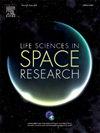Towards supervisory Model Predictive Control for circular life support systems in long-term space missions
IF 2.8
3区 生物学
Q2 ASTRONOMY & ASTROPHYSICS
引用次数: 0
Abstract
Regenerative Life Support Systems (LSS) fulfill the essential functions for human survival in space, such as atmosphere revitalization, water recovery, food production, and waste management, and are crucial for long-term space missions where the resupply of resources from Earth is not feasible or reliable. Operating a regenerative LSS poses several challenges, mainly related to its complexity, efficiency, and reliability. A set of heterogeneous subsystems involving mechanical, chemical, biological, and energetic processes has to be optimally coordinated in order to meet the requirements on mass, power, crew time, safety, reliability, sustainability and efficiency. In this paper, we address these challenges by proposing a supervisory control layer based on a nonlinear and time-varying Model Predictive Control (MPC) approach. The mathematical framework for deriving the prediction model addresses generic regenerative LSS. The MELiSSA (Micro-Ecological Life Support System Alternative) project developed by the European Space Agency is used here as the test case. For the first time, a complete dynamical model including all the MELiSSA compartments connected on all the phases (solid, liquid, gas) is derived, simulated, and controlled by a supervisory MPC. The design of such a controller follows a large set of requirements pre-defined by the MELiSSA project. Results on a mission lasting 14 weeks, which also includes a system failure scenario, are reported and evaluated for a specific MELiSSA network architecture.
长期空间任务循环生命维持系统的监督模型预测控制研究
再生生命支持系统(LSS)实现了人类在太空生存的基本功能,如大气恢复、水回收、粮食生产和废物管理,对于地球资源补给不可行或不可靠的长期太空任务至关重要。操作再生式LSS面临着一些挑战,主要涉及其复杂性、效率和可靠性。为了满足质量、功率、乘员时间、安全性、可靠性、可持续性和效率方面的要求,一组涉及机械、化学、生物和能量过程的异构子系统必须得到最佳协调。在本文中,我们通过提出基于非线性时变模型预测控制(MPC)方法的监督控制层来解决这些挑战。推导预测模型的数学框架针对一般再生LSS。由欧洲空间局开发的MELiSSA(微生态生命支持系统替代方案)项目在这里被用作测试案例。首次建立了一个完整的动力学模型,包括连接在所有相(固体、液体、气体)上的所有MELiSSA隔室,并由监督MPC进行了模拟和控制。这种控制器的设计遵循MELiSSA项目预先定义的大量需求。为期14周的任务结果,其中还包括系统故障场景,将报告并评估特定的MELiSSA网络架构。
本文章由计算机程序翻译,如有差异,请以英文原文为准。
求助全文
约1分钟内获得全文
求助全文
来源期刊

Life Sciences in Space Research
Agricultural and Biological Sciences-Agricultural and Biological Sciences (miscellaneous)
CiteScore
5.30
自引率
8.00%
发文量
69
期刊介绍:
Life Sciences in Space Research publishes high quality original research and review articles in areas previously covered by the Life Sciences section of COSPAR''s other society journal Advances in Space Research.
Life Sciences in Space Research features an editorial team of top scientists in the space radiation field and guarantees a fast turnaround time from submission to editorial decision.
 求助内容:
求助内容: 应助结果提醒方式:
应助结果提醒方式:


